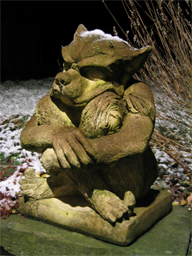
Now that all the hoo-ha has largely died down as to whether or not the full moon on the eve of 2010 was indeed blue, at least for the western world, it is interesting to ask why so many people so desperately felt it needed to be. For if nothing else was clear (although here in the north west of England, the sky was amazingly—if freezingly—clear that night) it was all too apparent that even people for whom celestial events usually hold little interest (and even less significance as far as impact on their daily lives is concerned) nevertheless most definitely and vociferously felt it auspicious that 2010 should be ushered in with a special and rare event—a "blue moon". Even if they had no idea what a blue moon signified, or why one at New Year was an impossibility. To my mind, it was a little sad that the only way they could have their "special and rare event" was by accepting a modern bastardisation of the criteria by which a blue moon is customarily determined. In other words, they essentially needed to cheat, and in the process render their treasured rare event significantly less rare. I suppose I should laud the fact that for all its reduced rarity, the event appeared to be no less treasured but I still feel that this is sad because it surely indicates lives so impoverished that the means by which special things are attained has ceased to be of concern; all that matters is that what is desired shall be acquired, one way or another.
But...
Whether one's blue moons come round every couple of years or so (and if you're in Australia or New Zealand, and you accept the modern popular definition, you can have two before Easter this year, isn't that wonderful? You won't get them eclipsed though. Sorry) or every 19 as they probably once used to do (and then only ever in February—something which now can never happen; isn't that an ironic twist to things?) one thing is true... a blog posting by the Old Gnome Himself is a truly rare and a precious event indeed.
Ironically, though, it was not the recent blue moon (or absence of it, rather) which prompted this latest posting so much as this winter's fall of snow. In the balmy far frozen north that is the coastal fringe of north west Lancashire, snow-falls of any size are about as rare as the proverbial blue moon (whatever you choose to have that phrase mean) and it is at least 15 years since we had one to compare with the current one, in terms of duration, prolonged low temperatures, and the effects on our ability to travel. One thing which having such events but infrequently permits is the ready determination of trends which would otherwise be lost in the noise (oh, the value of data decimation). And the thing that becomes readily apparent here is that, as a nation, we are coping progressively less well, year-on-year, with bad weather. Each time, we seem to be less prepared than the time before.
In her excellent study of English social rituals, customs and observances, "Watching the English", Kate Fox points out that we English are necessarily fretful about any prolonged spell of constancy in our weather and that more than a day or two of snow invariably leads to a declaration of disaster as "the whole country slithers and skids to a halt". I seems to me, however, that this is more than mere application of the English "moderation rule" (that too much of anything is to be deplored); it is a statement of fact. Increasingly, we in this country sit somewhere between a comfortable sense of complacency in which nothing bad can happen to us, and an alarming state of what I can only think of as laziness, in which when something bad does happen, we become first of all helpless to tackle it and, secondly, determined that there must be someone else to blame for it. I'm not sure just when this change came over the nation but personally, I blame the media for it all...
Oh well... perhaps I should just be thankful it only gets this cold here once in a blue moon?

